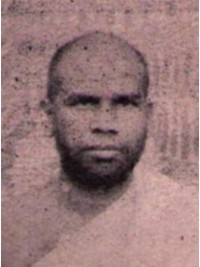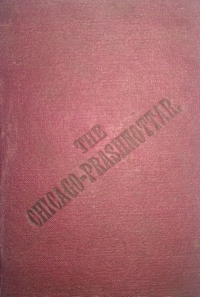Chicago Prashnottara
or
Questions and answers on Jainism for the Chicago Parliament of Religions.
- Salutation be to Him who is devoid of all blemishes and full of ail virtues whether He be Brahma, Vishnu, Shiva or a Jina.
- 0 Bhagavān, let you be what you are by name and condition in this or that period; if you are the same entirely devoid of sin and contamination, let my reverence be to you.
- He whom the Shaivaities adore as Shiva, the Vedāntins as Brahma, the Buddhists as Buddha, the rationalistic Naiyayikas as creator, the learned Jainās as Arhat and the Mimansikas as Eternal Action: May such a one - the Crest - jewel (Supreme one) of the three worlds realise our hearts' desire.
1. Question:
Has Ishvara or God any beginning?
Answer:
Godhead has no beginning because that which has a beginning has of necessity two causes-material and instrumental causes. Neither of these two causes can be established in regard to Godhead ergo Godhead is beginningless. Ishvara or God is nothing but the attainment of the stage of liberation which souls have either with or without bodies attained in the immemorial past or will obtain in the future. The state of liberation and God are identical.
2. Question:
How have people come to believe that there is God?Answer:Almost all believers in God have come to this belief by observing various types of the wonderful creation of the world which they say cannot but be attributed to a Being of infinite power who is the creator and called God. This argument has led people to believe that there is God but it is fallacious, because both sentient and insentient beings are potential with infinite powers, which combining with each other by the operation of the five forces i.e., Time, Nature, Function, uninterrupted Activity and Motive power have been evolving and dissolving this variegated universe from eternity.
This universe full of sentient and insentient beings has been in continuous manifestation and is therefore beginningless. Hence the argument proving the existence of God as creator falls to the ground.
3. Question:
What do ancient scriptures say regarding the belief in God?
Answer:
The Jain scriptures declare the Tirthankaras, who, free from eighteen short-comings, have attained liberation in their bodies and the Siddhas or the perfect who have attained that liberation after the dissolution of their bodies, to be God or Ishvara.
These stages of liberation with and without bodies are called Ishvara. The ancient Sankhya scripture does not believe in God. The modern Sankhya doctrine designated Seshvaravādi declares Mahadeo to be God. The followers of Jaimani's doctrine do not believe in God. The followers of Uttarmimānsā i.e. the Vedantic doctrine, believe in panthesim or the doctrine of regarding all that is in the world to be God. The followers of Nyaya and Vaisheshik doctrines believe in God who is One, Omnipresent, eternal, an everlasting abode of wisdom, omniscient, the dispenser of the fruits of the good and bad actions of beings and who consigns them to hell and heaven.
The followers of Buddhism believe in a God who is the preacher of their four eternal truths viz., existence of Sorrow or Misery, cause of suffering, cessation of sorrow and the path that leads to that cessation, and who incarnates himself in the world whenever his teaching is neglected.
4. Question:
What do reasoning and scriptures say in regard to the existence of God?
Answer:
The reasoning in establishing the existence of God is simply this. There are two kinds of words or expressions simple and compound. The examples of simple words are pot, cloth, soul, virtue, merit, sin, liberation, spirit, and those of compound words are cows' horns, buffaloes' horns, Raja's son, or hare's horns, man's horns, barren woman's son. The thing denoted by a simple word necessarily exists while the thing or things denoted by a compound word or expression may or may not exist. Ishvara or God is a simple word; hence it necessarily exists. [1]
As regards the view of the scriptures, the Jain Shastras hold that their Arhantas who have become Siddhas are Gods.
The Buddhists consider Buddha to be their God. The followers of Nyaya and Vaisheshik doctrine consider Shiva to be God and the Vedas consider the manifested creation to be the God.
5. Question:
What proof is there that God is the creator and the protector of the world?Answer:There is no direct or indirect proof establishing that God is the creator and protector of this world.
 Shrimat Vijyasandsuri
Shrimat Vijyasandsuri
